Plantar Fasciitis
Plantar Fasciitis in Downtown Kansas City, North Kansas City and Lee's Summit, MO
PODIATRIC MEDICINE
Plantar Fasciitis
Plantar fasciitis is the most common cause of heel pain that podiatrists see in their offices. Plantar fasciitis is literally inflammation of the ligament on the bottom of the foot that runs from the heel across the arch and attaches into the ball of the foot.
Symptoms
- Pain when first getting out of bed in the morning that may improve after taking several steps only to recur with or after being on your feet all day.
- A pain on the bottom of the heel or even a burning or tearing type of sensation in the arch area when standing, walking or running.
Common Causes
The most common cause of planter fasciitis is an instability in your feet or instability in the way the foot functions. If the arch flattens a little too much upon weight bearing, the planter fascia or ligament on the bottom of your foot stretches excessively like a rubber band with every step that you take. So, all day long the ligament is constantly being stretched excessively and it becomes irritated and painful. When you sit down or you go to bed at night, inflammation builds up along the irritated ligament and most commonly right where the ligament attaches to the heel bone. Inflammation is your body’s way of healing an irritated area. So, when you first step down in the morning, all that inflammation is right there at the heel and is very painful. After some stretching or after walking a few steps, you pump some of the inflammation away from the foot and heel and the pain eases up somewhat, but the more you’re on your feet the worse the pain gets. Contrary to popular belief, heel spurs on the bottom of the heel do not cause pain. Heel spurs are present because of a long standing low grade inflammatory response that causes part of the ligament to calcify or become bone. We do not have to remove heel spurs to get you comfortable, but the fact that a heel spur is present and identifiable on x-ray is a reflection of the long term instability that has been present, which has led to the inflammation and pain.
Diagnosis
We arrive at a diagnosis of plantar fasciitis after a physical examination and diagnostic testing including x-rays and diagnostic ultrasound. We take standing x-rays because we want to evaluate the positions of the bones and the joints in their functional position when they’re standing. X-rays taken when you’re lying on a table do little to help in evaluating low extremity instability. A diagnostic ultrasound is utilized to visualize the soft tissue directly including the planter fascia and other soft tissue structures. These tests help to identify the presence of inflammation, tearing or damage to the ligament itself, or the presence of other pathology including bursitis, or a painful fluid filled sac.
Treatment
There are two things we need to do to treat plantar fasciitis – reduce the inflammation and pain, and address the cause of the problem, which is usually instability in the way the foot functions.
Available treatments to reduce the inflammation and pain include stretching exercises, anti-inflammatory medications (NSAIDS), cortisone injections, physical therapy, immobilization, night splints, and custom molded functional orthotics. We usually utilize a combination of several of these treatment options in order to reduce the pain and inflammation. We then control the instability that is leading to the inflammation long term with custom molded functional orthotics. Orthotics are the only treatment that addresses the cause of the problem and are critical in maintaining long term comfort and preventing recurrence of this condition.
Kansas City Foot and Ankle proudly serves Kansas City MO, Kansas City KS and the surrounding areas.
